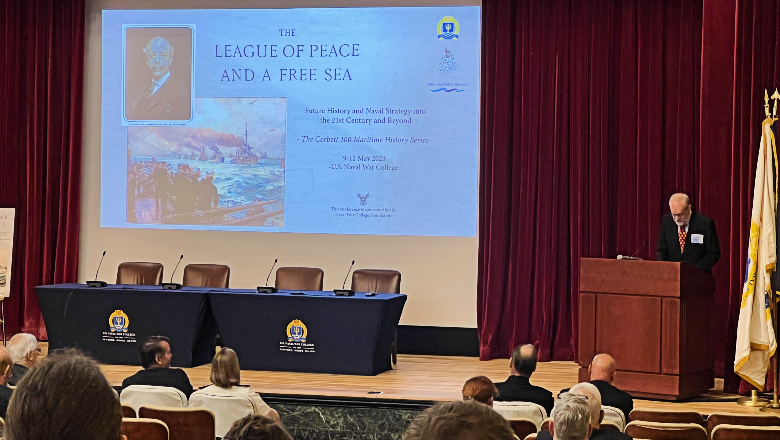“Sir Julian Corbett was a historian whose research efforts led to the development of national strategy who had been forgotten by many, through the Corbett 100 project we’ve seen a renaissance in understanding of his scholarship at a critical time where tensions in international relations have only increased. The timeliness of the project comes in a period where competition from seabed to space between hostile actors has drawn attention to the need of national strategy to respond to as nations seek to maintain the peace and address crisis unfolding in Ukraine and Indo-Pacific region”
Dr James W.E. Smith
05 June 2023
U.S Naval War College hosts conference with King's on defence and security challenges
Academics from the School of Security Studies in partnership with the U.S Naval War College and Australian Naval Institute, discussed historical questions, new research and contemporary defence and security challenges from seabed to space.

After two successful conferences in Australia and the UK, the U.S Naval War College hosted the third installment of the Corbett 100 project, an initiative that brings together scholars and military from around the world to explore the influence of historian and strategist Sir Julian Corbett on sea power and his relevance on contemporary questions surrounding maritime strategy, defence policy and national strategy.
The conference included more than 35 speakers from the US, UK, Japan, India and Australia who used the work of Corbett and other maritime thinkers of the past to explore issues relating to the future role of navies in peace and war.
Welcoming participants, Rear Admiral Shoshana Chatfield, President of the Naval War College, spoke of the importance of innovative thinking in the Navy.
“The history of naval warfare is filled with examples of commanders who achieved victory by thinking outside the box and using unorthodox tactics,” said Chatfield. “Today, commanders must be prepared to embrace new technologies and adapt their strategies as the situation demands.”
Over 300 academics, historians, veterans, and military personnel from Europe, Asia and Latin America have been involved in the Corbett 100 project, which has supported advancing close ties in the ‘AUKUS’ partnership between the UK, USA and Australia and helped inform the recent debate over Australia’s Strategic Review. The project is now in the process of publishing a book focused on maritime strategy, strategic theory, defence policy, naval doctrine, seapower, space, trade protection and future global security issues.
“Corbett believed that the development of naval education and strategic planning depended on the combination of an accurate understanding of past practice, and the evolution of strategic theory that addressed the unique and specific needs of individual nations. He recognised a distinctive maritime/economic ‘British Way of War’. While Corbett’s work was shaped by the highest academic standards, it was designed to meet the intellectual needs of serving officers and statesmen. Corbett’s multi-disciplinary approach remains relevant in the 21st century; consequently, this project has engaged and informed defence educators, decision makers and the development of naval policy, military doctrine and both grand and national strategy. Its outputs will continue to do so”
Professor Andrew Lambert FKC, Laughton Chair for Naval History.
Corbett 100 will continue to act as a network to advance research in naval history and maritime strategy collaboration between scholars worldwide, where King’s remains a home for expertise on naval history and maritime strategy.
The Corbett 100 project is a collaborative effort between the Laughton Naval History and Maritime Strategy Unit of the School of Security Studies at King’s, the U.S. Naval War College and the Australian Naval Institute.
Find more about the Corbett 100 project, including webinars, podcasts and publications here.


